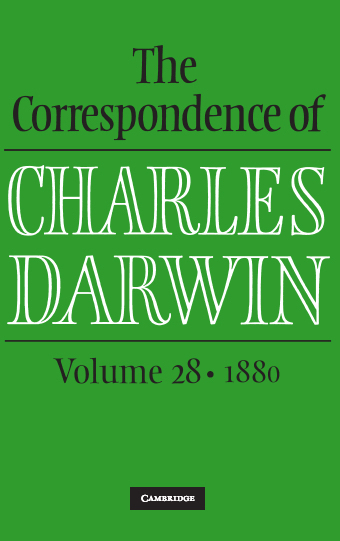1880 opened and closed with an irksome controversy with Samuel Butler, prompted by the publication of Erasmus Darwin the previous year. Darwin became fully devoted to earthworms in the spring of the year, just after finishing the manuscript of Movement in plants, his most ambitious botanical book. Many letters flowed between Darwin and his children, as he took delight in their accomplishments, and they continued to assist him in his experiments and observations. Financial support for science was a recurring issue, as Darwin tried to secure a Civil List pension for Alfred Russel Wallace, and continued his aid for James Torbitt and the quest for a blight-resistant potato.
Volume 28 of the Correspondence of Charles Darwin is now available.
Read more about Darwin's life in 1880 in our Life in letters series.
Highlights of the year recorded in the letters include:
One of the most painstaking of naturalists … most genial of men … [and] perhaps the most vehemently abused person in existence
—was the judgement of one of the members of the Lewisham and Blackheath Scientific Society after meeting Darwin at Down in July 1880. Forty-three members of the society were received in the drawing room and veranda to see Darwin exhibit and describe some of his most prized curiosities. They, and others, recognised 1880 as an important year, the year that On the origin of species, first published twenty-one years before in 1859, ‘came of age’. In November, a small deputation from the Yorkshire Naturalists’ Union came to Down to present Darwin with a memorial address. Among less scientifically motivated visitors, Darwin also welcomed to his garden ‘67 half-reformed criminals & vagabond boys’ supervised by a nonconformist pastor, and gave them each sixpence.
Mr Butler has attacked me bitterly, in fact accusing me of lying, duplicity, & God knows what
The year began with controversy. Samuel Butler was outraged that Ernst Krause, in his book Erasmus Darwin, alluded negatively to Butler’s views on Darwin’s grandfather Erasmus, but did not name him, while at the same time Darwin’s preface to the book implied that it had been written before Butler made his views known. Butler complained in a letter to the Athenaeum, and in his next book. Darwin, mortified, drafted letters exculpating himself (they are included in this volume), but his friends and relations persuaded him not to respond publicly.
As I have made some money by science, I must now lose some for science
Darwin was pessimistic about the likely success of his new book, On the power of movement in plants, and offered to publish it at his own expense. The worries were ill founded, however, for the book sold out quickly, and 500 more copies had to be printed at the end of November. Readers trained in zoology realised the implications of the work for the plant–animal boundary, the origins of the nervous system, and the nature of ‘sensitivity’.
My heart & soul care for worms & nothing else in this world
In the autumn of 1880, after finishing work on the proof-sheets of Movement in plants, Darwin began writing his final book, The formation of vegetable mould, through the action of worms. Both books explored the complexities of movement, forms of sensitivity, and the ability of organisms to adapt to varying conditions, and both had been decades in the making, drawing on research interests that Darwin returned to time and again.
I have seldom wished for anything so much, as to succeed in getting some provision for Wallace.
In October, Darwin again took up the project, abandoned in 1879, of getting a Civil List pension for Alfred Russel Wallace, co-discoverer of the theory of evolution by natural selection. With the help of Arabella Burton Buckley and Thomas Henry Huxley, Darwin drew up and circulated a memorial to leading scientists. In early 1881, the prime minister, William Gladstone, granted their request, writing personally to Darwin. The draft memorial and other details are included in an appendix to this volume.
I should not be myself if I did not protest that you have all been shamefully extravagant to spend so much money over your old father, however deeply you may have pleased him.
Early in the year, Darwin’s children clubbed together to buy him a fur coat, which was left for him to find on the table in his study. Darwin admitted that he suffered very much from cold when travelling: ‘The coat, however, will never warm my body so much as your dear affection has warmed my heart.’ Younger members of the family thrived. On 3 January, Darwin’s son Horace married Ida Farrer, and in the summer, Darwin visited them in Cambridge. Darwin and Emma continued to look after their small grandson, Bernard, especially while his father, Francis, spent the summer months studying botany in Germany. Summing up his condition for an old friend on Christmas day, Darwin wrote:
I go on working at Science & in fact I am turned into a sort of machine for observing facts & grinding out conclusions, & am never happy except when at work.



